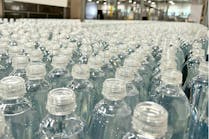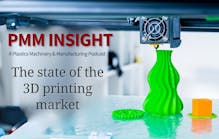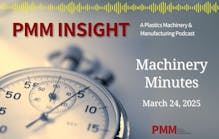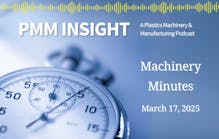Trash becomes resin; thermoforming PET caps; state of the plastics treaty: Machinery Minutes
Key points on this podcast
- UBQ Materials has developed a process to turn organic waste into biobased composite materials. Think banana peels, dirty diapers, chicken bones, greasy pizza boxes or even unrecyclable plastic. Now they want to build a U.S. plant.
- A new thermoforming technology from Origin Materials can produce PET and recycled PET caps at a speed that’s competitive with other processes.
- Talks on a global treaty to end plastic pollution drag on. If there's no meaningful resolution, the plastics industry itself could be the biggest loser.
- Follow PMM and other Endeavor Business Media publications for news and analysis on tariffs and other directives from the Trump administration.
Transcript
Hello, welcome to PMM Insight, a Plastics Machinery & Manufacturing podcast. I am your host, Ron Shinn, editor of PMM.
This is an episode of Machinery Minutes, where at the beginning of each week I share with you three things you need to know in about three minutes. You can read the complete stories on plasticsmachinerymanufacturing.com.
Let’s get started.
Story Number 1 is very interesting: Plenty of OEMs want to use more sustainable plastics in their products, and prime candidates are bioresins. But where are bioresins going to come from?
UBQ Materials wants to build a plant in the U.S. to turn organic waste into biobased composite materials. Think banana peels, dirty diapers, chicken bones, greasy pizza boxes or even unrecyclable plastic.
UBQ, based in Israel, has operated a pilot plant in Israel since 2019 and a production plant in The Netherlands since 2023 that takes organic, household waste, dries, chops and fluffs it. Then it puts the fluff through a reactor to reduce the organic elements. The company says the resulting material can be blended with most resins or used as a replacement to fossil-based resin.
Mercedes-Benz, McDonald’s and PepsiCo are already using the material in some products.
You can read all the details in our story headlined “UBQ Materials turns trash into plastic.”
Number 2: Until now, PET bottle caps have been a problem for recyclers. The caps, generally made from HDPE, usually get swept away when the bottle is recycled.
Now, a new thermoforming technology from Origin Materials, can produce PET and recycled PET caps for 20-ounce bottles at a speed that’s competitive with other processes.
Origin’s first machine, dubbed CapFormer, went into production in February at the Reed City Group in Michigan. Origin expects to have eight CapFormer lines in operation at Reed City by the end of this year. The technology is available for license to others.
The overall caps and closures market is huge – estimated by Origin Materials at $65 billion annually. The company is also looking at larger caps, such as peanut butter lids, for the new process.
The complete story is headlined “Origin Materials solves the PET cap conundrum.”
Number 3: You may be tired of hearing about the long-running negotiations led by the United Nations to draft a global treaty to end plastic pollution. The first five negotiating sessions failed to crearte a treaty and a sixth session is scheduled to start on Aug 5th in Geneva, Switzerland.
The talks are in trouble and there is a very real chance there will be no meaningful treaty. If that happens, who loses?
In an opinion column that first appeared in Plastics Recycling magazine, I argue that the plastics industry could be the biggest loser. That would include processors, suppliers, OEMs and recyclers.
The growing anti-plastics sentiment is only going to get louder, and it is important the industry is seen as being able to solve its own problems. Rightly or wrongly, the plastics industry owns the plastic pollution problem.
How would a treaty help? You can read my suggestions in the article headlined “A global treaty would benefit the plastics industry.”
Here’s a bonus tip: Endeavor Business Media, PMM’s parent company, has more than 90 brands and many of them report on tariffs and other issues affecting manufacturing. We regularly post their articles on issues that could impact the plastics industry. Look for the latest news in the upper right section of our home page.
Those are my Top 3 items for this week. We have a new list every Monday.
I hope you have enjoyed this episode of Machinery Minutes. You can always find our podcasts and the latest information about the worldwide plastics industry on our website, www.plasticsmachinerymanufacturing.com and on social media.
Remember to subscribe to the PMM Insight podcast on your favorite podcast app and tell a friend or colleague if you think they would enjoy the show. This podcast was produced by Plastics Machinery & Manufacturing, an Endeavor Business Media brand.
Ron Shinn | Editor
Editor Ron Shinn is a co-founder of Plastics Machinery & Manufacturing and has been covering the plastics industry for more than 35 years. He leads the editorial team, directs coverage and sets the editorial calendar. He also writes features, including the Talking Points column and On the Factory Floor, and covers recycling and sustainability for PMM and Plastics Recycling.
Sign up for Plastics Machinery & Manufacturing Newsletters
The weekly voice for Plastics Processors and Manufacturers of Plastics Products. (3x/week)
Highlighting the most popular PMM articles as chosen by you, our readers. Discover the key topics of your peers and competitors, across the industry. (Monthly)
The latest news on plastics recycling equipment and technology. (Monthly)






